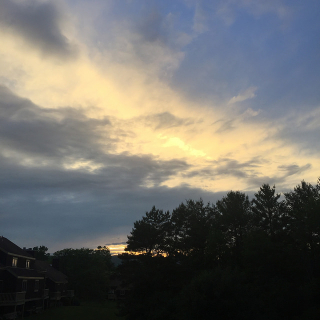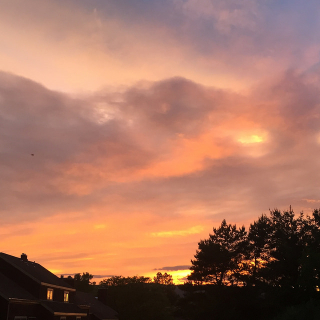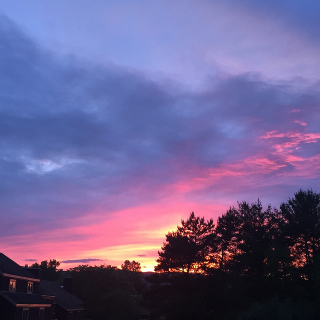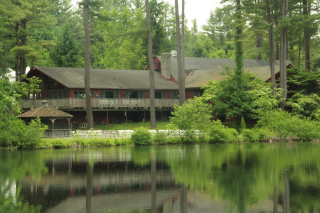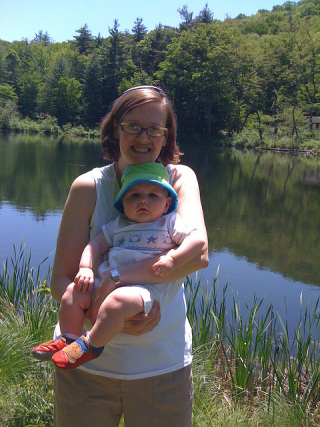Rachel Barenblat's Blog, page 86
June 15, 2017
Good
Beloved, You are good
and you wield goodness
in shaping creation
and every single day
in Your goodness
and with Your goodness
You make us new
with all created things.
You make me new.
I cling to yesterday
(who would I be
without the sorrows
that have worn grooves
into my back?) but
that's my own smallness.
You've made me new
formed me for this new day
a sapling unbowed.
The knot in my stomach
the knot in my throat --
You untie them.
Can I sit with You
for even a few minutes
before I tangle myself again?
In the yotzer or prayer, the blessing for God Who creates light that is part of our daily liturgy, we find the line "המחדש בטובו בכל יום תמיד מעשה בראשית/ ha'm'chadesh b'tuvo b'chol yom ma'aseh bereshit," which describes God as the One Who daily renews, with God's goodness, the work of creation. This poem arose out of that line, and could be read or davened as part of shacharit (morning prayer), perhaps with the first and last lines of the Hebrew prayer as bookends. If you use this poem in this way, let me know if it works for you!

June 14, 2017
Change
1.
The CSA's first distribution week:
the flower gardent nascent, not yet formed.
The fields are all potential. No one knows
what plagues or pleasures yet will come to pass.
Who can say which plants will thrive this year?
This week the share's all leaves in shades of green:
tatsoi, arugula, yokatta na.
Atop my bag I nestle precious roots:
French radishes, like fingers, long and pink.
Pick up a pen to mark that I was here
on this first week in June, the season's cusp.
My name's listed alone, while his is paired.
The tears that come I blink away, and blame
upon the radishes' surprising bite.
2.
Clouds of pearly fluff float through the air
revealing hidden currents. Poplar seeds,
each with a silken parachute: they twirl,
make visible the breeze that strokes my neck.
I'm floating too, buoyed sometimes by forces
I can't see. Other times I feel
discarded by the tree that once was home.
Every breath I take's an act of trust
that in time I'll land, and root myself
in unfamiliar soil I can't yet know.
Can I learn to love being so light
I no longer insist I'm in control?
"God was not in the cloud: the still small voice..."
I wait, and drift, and listen for its sound.
3.
Skills that I've begun to learn this year:
How not to shrink. How not to defer.
How to claim the whole bed as my own.
How to shop and cook for every meal.
How to pull over and cry by the side of the road.
How to be triggered by Facebook. How to dress
to kill -- on New Year's Eve, in low-cut silk
chiffon bought secondhand -- without a date.
How to be alone, night after night
(after I put the kid to bed), and wake
likewise alone, and if not celebrate
my solitude, at least no longer mind.
When will I earn my merit badge in grief?
This course is long, and there's no syllabus.
4.
And then one day I wake and nothing hurts.
No ache behind my throat. Modah ani!
It isn't "closure," quite; that's just a myth.
Some things are linear, but never this:
growth doesn't come in measurable steps.
The music changes. So, too, does the dance.
I'll weep again, maybe by afternoon
but now hope rises in me like the tide.
I have no map: so what? I turn the dial
on my kaleidoscope. New pieces fall.
Each day a new blank page waits to be filled
and I can't skip ahead to see what comes.
I let my fingers hover on the keys.
Only one way to find out what I'll write.
5.
When Moses saw the bush that burned, he gaped.
The glowing heat did not consume the wood.
The branches sang with tongues of vibrant flame.
God said, "This place is holy ground: now go.
The One Who Is Becoming sends you forth."
How did it feel to be the sign, afire?
As Frankl said, "Those who give light must burn."
And in my burning, can I mark the way
for others on this labyrinthine path?
I'm unsure where I'm going, but I know
each character in Torah lives in us.
If I'm the bush, then I'm the prophet, too:
released from habit, tender and exposed.
Take off my shoes, and let myself be changed.
I haven't written sonnets in a while. There's something about the constraint of the form that matches well, for me, with writing about these emotionally complicated realities.
"God was not in the cloud: the still small voice..." See I Kings, 1:19.
Modah ani. The morning prayer for gratitude, about which I've written many times before.
It isn't "closure," quite; that's just a myth. See On divorce and ambiguous loss.
"Those who give light must burn." I massaged the quote a bit to make it fit the iambic pentameter; the original is "What is to give light must endure burning."
"This place is holy ground: now go. The One Who Is Becoming sends you forth." See Exodus 3, the story of the bush that burned but was not consumed.
Take off my shoes, and let myself be changed. That's a reference to a Hasidic commentary on Exodus 3:5; read more.

June 11, 2017
Holding my hand
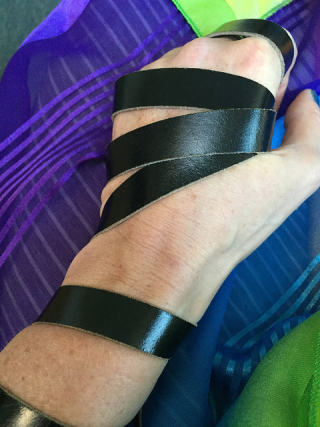 When I wrap the straps around my arm
When I wrap the straps around my arm
Shekhinah holds my hand.
Her small brown fingers intertwine
with mine. She holds on tight.
She whispers courage in my ear.
Says "don't hold up: be held."
Kisses my forehead, a mother
checking for fever or giving a blessing.
Our fingers tangle like lovers.
She strokes my palm and I shiver.
In grief I always think I'm alone --
think no one sees me, or wants to.
She shakes her head, exasperated
and fond. I keep forgetting.
Long after I've let go of her hand
she's still holding me.

June 8, 2017
the skies here
All through the long winter, I wait with eager anticipation for the long days of June. I have this in common with my mom, who also loves summertime's long days -- though at her latitude the winter days aren't as short, nor the summer days as long, as those I experience here. One of the things I anticipate most about summer is sitting outside in the late evening, listening to birdsong, watching the sky change color.
The house where I used to live was on a mountaintop, and it had absolutely spectacular views. When we first went to see it eighteen years ago, the real estate agent who was showing it to us laughed at the look on my face when I got out of the car and looked out at the view and the sky. Leaving that view was one of the hardest things about leaving that house.
But I am blessed that the place where I live now has a little mirpesset, a little balcony overlooking an expanse of green. (That's where I built my sukkah in the fall.) And here too, there is a patch of horizon and trees and sky. It may not have the over-the-top splendor of the view from the old place, but it has afforded me some beautiful glimpses of the changing sky.
The sky's transition from afternoon to evening, sunset to nightfall, is predictable. It happens every day (unless there is rain.) It is the very definition of mundane: ordinary, worldly, banal. And yet sometimes it opens my heart to connection with transcendence. In this, it is like other ordinary and banal things: rainbows, or the way my heart dances when I see my child joyful, or what I feel when I marinate in love.
Related:
Who rolls back light before dark and dark before light, 2016
Summer gratitudes, 2015
Looking at the prayer for evening in a new light, 2013
This post borrows its title from the name of my first collection of poems, published by Pecan Grove Press in 1995.

June 6, 2017
In humbling company
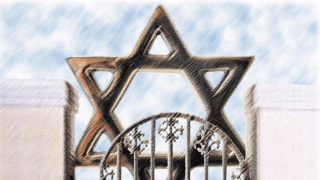 Although this came out a month ago, it only last night reached my eyes: Judaism Shines Through All They Do: Ginsburg, Sandberg, Barenblat. Written by Haley Codron, this opinion piece ran last month in the Orlando Sentinel, and it puts me in some truly humbling company.
Although this came out a month ago, it only last night reached my eyes: Judaism Shines Through All They Do: Ginsburg, Sandberg, Barenblat. Written by Haley Codron, this opinion piece ran last month in the Orlando Sentinel, and it puts me in some truly humbling company.
As May is Jewish American Heritage Month, I want to honor three women whose Judaism shines through all they do: Supreme Court Justice Ruth Bader Ginsburg, Facebook COO Sheryl Sandberg and “Velveteen Rabbi” blogger Rachel Barenblat.
As I contemplate the leadership of Ginsburg, Sandberg and Barenblat, I’m reminded of advice from my parents. They told me what to discuss – or not to discuss – at dinner tables: politics, religion and money. A part of me understands where my parents were coming from; the three topics are flashpoints. But there has to be an element of “picking sides.” Which is precisely why the three women make a difference – a positive difference, and have influenced me and countless people around the world...
Codron writes about Ruth Bader Ginsburg (one of the most extraordinary women alive today, in my estimation), Facebook COO Sheryl Sandberg (whose book Option B I've been intending to read), and me. I'm honored to be in their company.
You can read the whole piece here: Judaism Shines Through All They Do: Ginsburg, Sandberg, Barenblat.

June 5, 2017
Light
Step one: we attuned ourselves to light.
I don't mean the sun, but what came first.
(Heavenly bodies were day four.) The fire
of the burning bush, the glowing cloud
that hovered over the mishkan, the presence
of creation's supernal flame made us lift
our eyes. When the pillar would lift
we set off; when it settled, we'd light
our cookfires. Back then we had presence
of mind to check the celestial forecast first.
Didn't let our desires to move cloud
our judgment. We were on fire
for the One Whose presence gleams. Afire,
we reached step two: learning how to lift
our hearts even when the cloud
didn't move. We can travel light
even if we're not going anywhere. First
we learn how to live with holy presence.
Step three: open to what wholly presents
itself. Strike the iron while the fire
is hot, but paint our doorposts first.
When we left Egypt we knew how to lift
our hearts to the One, how to light
the tinder of prayerful spirit into clouds
of incense. But God was not in the cloud:
only hinted-at in the wordless presence
that filled the tabernacle with light.
"More than God wants the straw fire
God wants the well-cooked heart," so lift
yourself to the altar. Sometimes the first
thing to do is burn. Sometimes first
we bank our internal fires, offer up the cloud
of self that rises. When the lift
comes, when our hearts become our presents --
that's the time to add fuel to the fire.
The One Who rolls back darkness before light
first tunes our internal radio to the presence.
Then we notice when we get cloud, and when fire.
Let our spirits lift, and become light.
I don't mean the sun, but what came first. At the beginning of Bereshit (Genesis) God creates light, but sun and moon and stars don't materialize for another few days. From this our tradition intuits that the light of creation was something other than literal light, and there are many beautiful teachings about the supernal light of creation hidden away for the righteous.
The fire of the burning bush. See Exodus 3. One of my favorite teachings about Shabbat candles holds that when we kindle lights on Shabbat, we are to see in them the supernal light of creation and the light of the bush that burned but was not consumed.
The glowing cloud that hovered over the mishkan... when the pillar would lift. See this week's Torah portion, B'ha'alot'kha, in which a cloud hovered over the mishkan (the tabernacle / dwelling-place-for-God's-presence). When the cloud lifted, we went on our journeys, and when it rested, we stayed put. (For a beautiful d'var Torah on that theme, see Rabbi David's The Reason for Patience.)
Strike the iron while the fire / is hot, but paint our doorposts first. The Exodus story is a paradigmatic narrative of leaping when the opportunity presents itself... but before so doing, the children of Israel painted blood on the doorposts of their houses, an act we now echo in placing a mezuzah on the doorposts of ours. Doors are liminal spaces -- life is full of liminal spaces -- and it's up to us to make them holy.
But God was not in the cloud. See I Kings 19:11-12. God was not in the earthquake, nor in the fire, but in the still small voice.
More than God wants the straw fire / God wants the well-cooked heart. A teaching from the Kotzker Rebbe.
The One Who rolls back darkness before light. See maa'ariv aravim, our prayer for evening -- here it is in several variations.
Tunes our internal radio to the presence. This metaphor comes from Reb Zalman z"l, who used to speak about how God broadcasts on all channels and we receive revelation where we are attuned.

June 2, 2017
Glimpses of Shavuot 5777
Isabella Freedman, where I just spent Shavuot.
Back when I first started blogging, I used to write about every retreat I attended. I was so thirsty for connection with Jewish tradition and with God! I kept a paper journal tucked into my tallit bag, and I wrote down everything. When I got home I would type up excerpts from my handwritten notes and turn them into blog posts. Everything was surprising and meaningful and new.
These days it tends to be my job to help to create the container within which the retreat experience unfolds. The teachers whose words I so thirstily drank in are now colleagues, and in many cases friends. And I'm no longer writing things down during every spare moment. All of these shifts have changed my ability to share retreat experiences with all of you. Still, I will try.
The first thing I want to remember from Shavuot 5777 took place before the retreat even began: I was part of the beit din, the rabbinic court, presiding over a conversion. After an extraordinary conversation, we walked together, singing Pure Heart, to Lake Miriam for mikveh. When the new Jew emerged from her third immersion, she was radiant with light.
I want to remember the two nights of davenen in the Isabella Freedman sanctuary where years ago I experienced most of DLTI. Both nights I sat with hevre, beloved colleague-friends, with whom I had the deep pleasure of singing in harmony, guided by Shir Yaakov's gentle presence and beautiful melodies and by Shoshana Jedwab's rich and resonant drumming.
I want to remember the late-night learning on the first night of Shavuot. In the wee hours of the morning I was in the beige yurt, where Rabbi David Evan Markus taught a lesson on how "why" grew up in Torah. And then I taught a lesson on eit ratzon, "a time of will / a time of yearning," and the giving of Torah, and what it means to say that God yearns to give.
I want to remember how it felt to wake, after a three-hour catnap, to daven hallel outdoors by Lake Miriam. I want to remember Rabbi Jill Hammer's's gorgeous Torah service on the first morning, and how she mapped the blessings that went with the first three aliyot to the three mother letters from Sefer Yetzirah, and paired each with a different color / texture of chuppah.
I want to remember the first afternoon of Shavuot: both attending Rabbi David Ingber's beautiful teaching in which he shared classical (midrashic and Zoharic) texts on suckling / nursing and the revelation of Torah, and then going for a walk with two hevre afterwards in the glorious sunshine, and unpacking his teaching and its meaning for us as we walked.
I want to remember teaching after dinner on the second night about the silent aleph and revelation (including that text from the Ropcyzer about seeing God's name in the face of every human being, which I've shared here before, as well as a variety of other texts about the aleph and revelation.) It was so sweet to share teachings that I love and to harvest responses from the room.
I want to remember sitting with three dear friends outside the sanctuary on the second morning of the holiday, arms around each other, singing and laughing through tears. And I want to remember doing "waking dream" work with Reb Eve in the gazebo beside the lake that same morning after davenen was over, and the images that arose for me, and what those images meant.
I'm not sure any of the words I've just written actually capture for you what the Shavuot retreat experience was like at Hazon / Isabella Freedman this year. In a certain way, the holiday retreat experience is ineffable: it's as much about the experience, the melodies and conversations and the early-morning mist over the water, as it is about anything I can chronicle or describe.
Even if I can't write about it in a way that really conveys what the experience was like for me this year, I'm grateful for the opportunity to take a deep dive into one of the three great ancient pilgrimage festivals, and grateful to have been given the chance to help create the retreat experience for some 250 others, especially in such a beautiful and holy place.

May 31, 2017
First fruits
רבונו של עולם -- Master of the Universe
שכינה, מקור חיינו -- Divine Presence, Source of our Lives:
We come before You today in celebration
And in gratitude. We come before You
Bearing the first fruits of spring harvest
Grown from this beautiful patch of earth:
Radishes and sorrel, herbs and grasses.
We come before You bearing the fruits
Of the Omer count we've just completed:
Lovingkindness and boundaries, balance
And foundation. We come before You bearing
The work of our hands and the devotion of our hearts
The labor of our minds and the fire of our spirits.
Infuse us with gratitude for these gifts
And remind us that they belong, as we belong,
To You. Blessed are You, Wholly One,
Giver of so many gifts to us
Which we return to You in love.
For the second year in a row, I was asked to offer something before the kiddush and after the Shavuot First Fruits parade at Isabella Freedman.
Chag sameach -- a joyous festival to all!

May 29, 2017
New essay on Modah Ani
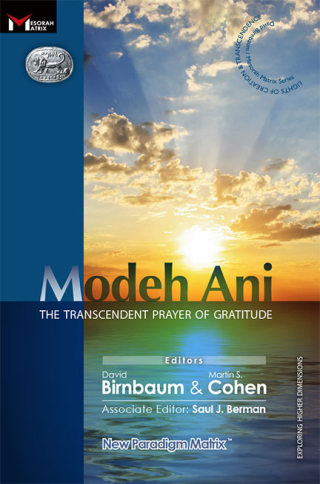 A while back I was solicited to contribute an essay to a volume on modeh / modah ani, the morning prayer of gratitude, edited by David Birnbaum and Martin S. Cohen, to be published by Mesorah Matrix. Longtime readers of this blog know that modah ani is one of my very favorite prayers; I said yes immediately!
A while back I was solicited to contribute an essay to a volume on modeh / modah ani, the morning prayer of gratitude, edited by David Birnbaum and Martin S. Cohen, to be published by Mesorah Matrix. Longtime readers of this blog know that modah ani is one of my very favorite prayers; I said yes immediately!
The volume is part of a ten-volume series from Mesorah Matrix, of which six books have thus far been published. I just received my contributor's copies, and wow, am I delighted.
I'm in some phenomenal company. Here are glimpses of some of the essays about which I'm most excited:
David Ellenson wrote about Modeh Ani and the gifts of gratitude and awareness. Elliot Dorff wrote about how the prayer helps us awaken to the new day. Rebecca Sirbu wrote about how the prayer can have a personal impact on one's life. Aubrey Glazer wrote about the prayer in the context of Shoenberg and the Kotzker Rebbe.
Dalia Marx offered a contemporary Israeli perspective on the prayer, juxtaposing it with Israeli pop songs. José Rolando Matalon wrote about it in the context of Odeh la-El, a sixteenth-century piyyut. Shulamit Thiede wrote about the prayer and gratitude for the presence of death. Orna Triguboff wrote about the nighttime journey of the soul.
And I wrote about the prayer as a four-worlds tool for personal spiritual transformation.
You can page through the book online at the Mesorah Matrix website if you are so inclined.
The volume is available on Amazon for $36 -- not cheap, but I think it's absolutely worth it: Modeh Ani: The Transcendent Power of Gratitude. Deep thanks to the editors for including my work!

Shavuot and parenthood, then and now
When I think of my last Shavuot of rabbinical school, all I can remember are glimpses. Like the slide shows that I remember my parents used to project on the dining room wall. Most of my memories of my son's first year of life are like that. They're a punctive story told through images. He didn't sleep through the night until he was well over a year old, so my memories of that first year are spotty. The visuals are points on a line that don't quite add up to a whole.
When I try to call up the slideshow of those Shavuot memories, I see the square of light that used to shine when the carousel was first turned on, and then I see disconnected moments. Click: trying to get my kid to sleep in the portacrib in the closet area of my room at Isabella Freedman. Click: walking with the stroller in the middle of the night to the great hall, because if my kid wasn't going to sleep, then by God I wasn't going to miss Reb Zalman's 4am teaching.
Click: pushing the stroller in circles around the back of that room while I listened to the rebbe teach. He taught about the Torah of our mothers. Click: morning davening, singing in harmony with beloved friends. (Have I ever known a more fervent form of prayer than singing in harmony?) Click: morning davening, leaving the room so I could nurse my son in private on the other side of the wall. Nursing him while still immersed in the sounds of the community singing.
My son and me: Shavuot, Isabella Freedman, 2010.
My son was six months old then. We had survived colic and postpartum depression. Sleep was still hard to come by. When I went to Isabella Freedman for Shavuot that year, I packed the "bouncy seat," the little inclined chair that played music and vibrated gently. I carried it with me. On the second morning of Shavuot I parked him in that seat so I could try to daven my way wholly through shacharit for the first time since he was born. It was harder than I expected.
By the following Shavuot, I was ordained and in the process of negotiating for what would become my first rabbinic position, serving Congregation Beth Israel, where I still serve. In coming years I would occasionally send congregants to Isabella Freedman to hear Reb Zalman teach, but I didn't feel able to go myself. I didn't return to the Shavuot retreat experience until last year, when I took a delegation from my congregation with me. (This year I will do the same.)
The year I took my infant son to Shavuot at Isabella Freedman, I knew that I would someday tell him that over the first Shavuot of his life I took him to hear my rebbe teach, and to receive a blessing from the teacher of my teachers. I wish I could remember the blessing that Reb Zalman gave him. I was still so sleep-deprived that my brain wasn't forming longterm memories, and I didn't know then that if I didn't write it down immediately it would become lost to me.
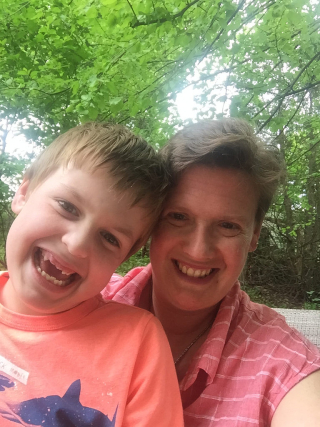
My son and me, a few days ago.
I couldn't have imagined, then, what life would be like now. My son is seven and a half now: tall and lanky, funny and sweet. This past Shabbat we played Trivial Pursuit. The first question he drew was one about which day is considered the day of rest in Judaism, and he crowed with delight. He sings me songs, reads aloud, assembles his stuffed animals into elaborate families. (One is a family of stuffed kittens. The other features both Pokémon and giraffes.)
Parenthood has given me new ways to understand the idea that God is constantly revealing Torah. The Kotzker Rebbe taught that Shavuot is called the day of the receiving of the Torah, not the day of its giving, because God is always giving. Shavuot is when we notice the gift that we receive. Parenthood too is an adventure of always-receiving, though I'm not always mindful of the Torah that's coming through. I forget, lose track, and get caught up in ordinary life's minutiae.
And then every now and again I wake up again to the reminder that I can learn from the Torah of every human being I meet, including and especially the tall funny cuddly seven-year-old human being who is in my care and keeping. I'm grateful for what he teaches me about finding God in the presence of change. One of our tradition's names for God is Ehyeh Asher Ehyeh, "I Am Becoming Who I Am Becoming." Parenthood is an amazing reminder that in change, we glimpse God.

Rachel Barenblat's Blog
- Rachel Barenblat's profile
- 6 followers


